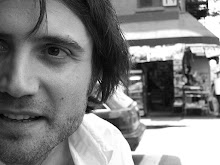Sooner or later, the great men turn out to be all alike. They never stop working. They never lose a minute. It is very depressing. --V.S. Pritchett
A friend of mine pointed me to a website called Daily Routines yesterday, which chronicles how writers, artists, and other interesting people organize their days. Compiled mostly from interviews and biographies, it's an intimate portrait of some startlingly disciplined and monastic work routines, juxtaposed against a few who find no need for routine. I wish there were more portraits of musicians (only Satie appears), but hopefully more will come along, especially as much of the content seems reader-generated. It's fascinating to read, and demonstrates so well the lack of any rule or formula in the creative world.
Here's the entry for Franz Kafka:
Begley is particularly astute on the bizarre organization of Kafka's writing day. At the Assicurazioni Generali, Kafka despaired of his twelve-hour shifts that left no time for writing; two years later, promoted to the position of chief clerk at the Workers' Accident Insurance Institute, he was now on the one-shift system, 8:30 AM until 2:30 PM. And then what? Lunch until 3:30, then sleep until 7:30, then exercises, then a family dinner. After which he started work around 11 PM (as Begley points out, the letter- and diary-writing took up at least an hour a day, and more usually two), and then "depending on my strength, inclination, and luck, until one, two, or three o'clock, once even till six in the morning." Then "every imaginable effort to go to sleep," as he fitfully rested before leaving to go to the office once more. This routine left him permanently on the verge of collapse. Yet when Felice wrote to him...arguing that a more rational organization of his day might be possible, he bristled.... "The present way is the only possible one; if I can't bear it, so much the worse; but I will bear it somehow."
It was [Max] Brod's opinion that Kafka's parents should gift him a lump sum "so that he could leave the office, go off to some cheap little place on the Riviera to create those works that God, using Franz's brain, wishes the world to have." Begley, leaving God out of it, politely disagrees, finding Brod's wish probably misguided. Kafka's failure to make even an attempt to break out of the twin prisons of the Institute and his room at the family apartment may have been nothing less than the choice of the way of life that paradoxically best suited him.
It is rare that writers of fiction sit behind their desks, actually writing, for more than a few hours a day. Had Kafka been able to use his time efficiently, the work schedule at the Institute would have left him with enough free time for writing. As he recognized, the truth was that he wasted time.
The truth was that he wasted time! The writer's equivalent of the dater's revelation: He's just not that into you. "Having the Institute and the conditions at his parents' apartment to blame for the long fallow periods when he couldn't write gave Kafka cover: it enabled him to preserve some of his self-esteem."
Zadie Smith, The New York Review of Books, July 17, 2008 (reviewing The Tremendous World I Have Inside My Head: Franz Kafka: A Biographical Essay by Louis Begley)
Subscribe to:
Post Comments (Atom)





No comments:
Post a Comment